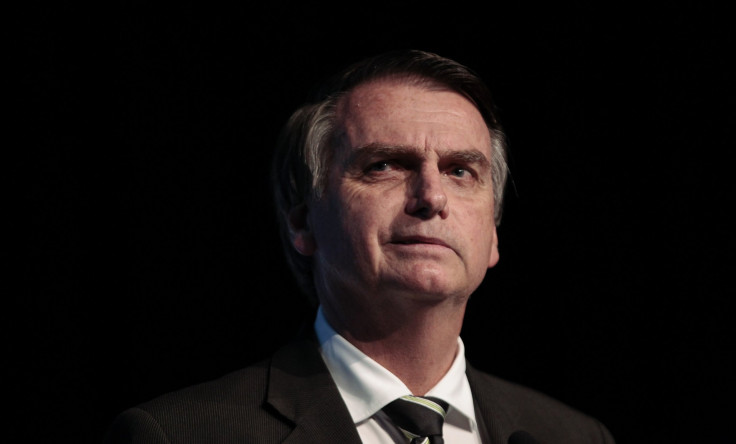Who Is Jair Bolsonaro? Trump Congratulates Brazil's ‘Far-Right’ President-Elect

President Donald Trump called and congratulated far-right lawmaker Jair Bolsonaro, who won the Brazil presidential elections Sunday.
Reports said the new president-elect rode a wave of frustration over corruption and crime which resulted in the dramatic swing to the right in the world’s fourth-largest democracy.
Recebemos há pouco ligação do Presidente dos EUA, @realDonaldTrump nos parabenizando por esta eleição histórica! Manifestamos o desejo de aproximar ainda mais estas duas grande nações e avançarmos no caminho da liberdade e da prosperidade!
— Jair M. Bolsonaro (@jairbolsonaro) October 29, 2018
“We cannot continue flirting with socialism, communism, populism and leftist extremism ... We are going to change the destiny of Brazil,” Bolsonaro said in an acceptance speech.
In his campaign, the 63-year-old promised to clean up politics, shrink the state and crack down on crime.
“We will continue with our heads held high, with determination and with courage,” he said. “We have a lifelong commitment to this country and we will not allow this country to go backwards.”
With 100 percent of ballots counted, Bolsonaro had 55.1 percent of the votes in the second round of presidential elections against left-wing candidate Fernando Haddad of the Workers Party (PT). Haddad received 44.9 percent of the votes. In the first round of elections Oct. 7, Bolsonaro had fallen a few percentage points short of a win, a report in Bloomberg said.
The new president-elect has been criticized for his extreme far-right viewpoints and approach to indigenous people and homosexuals among other things. According to a report in Reuters, the former army captain will be the first president with a military background since the end of Brazil’s 1964-1985 military dictatorship.
Bolsonaro has previously praised Colonel Carlos Alberto Brilhante Ustra who tortured about 40 opposition members to death during the military dictatorship period in the country, and added he will appoint military leaders to top posts, a report in the New York Times said.
Many critics of the new president have compared him to Trump, with some saying he was worse than the latter.
Bolsonaro was born in the town of Glicério, São Paulo, on March 21, 1955, and was of Italian descent. He went to the prep school of the Brazilian Army in his last years of high school, and then attended Academia Militar das Agulhas Negras (Brazil's main military academy) and graduated in 1977. He served in the military for 17 years and reached the post of captain. He then went on to enter politics in 1988.
During his political career, which has spanned over nearly three decades, his hostility toward black, gay and indigenous Brazilians and to women, as well as for his admiration of dictatorial regimes has earned him immense criticism from around the world.
But recently in a speech to the nation, he called for overall unity in the country.
“This country belongs to all of us, Brazilians who were born here, and those who are Brazilian at heart. Brazil is a country of diverse opinions, colors, and orientations. The law is for everyone,” he said according to a report in the Washington Post.
He ran a social-media-centered campaign similar to Trump, promising to crack down on the rampant crime and corruption in the country, with Bolsonaro’s followers believing former President Luiz Inacio Lula da Silva and PT were responsible for the current situation of Brazil.
The president-elect earlier vowed to withdraw Brazil from the Paris Agreement but retracted the idea a few days before the election. However, he has promised to weaken the form and enforcement of Brazil’s climate policies, including allowing the development of fracking.
He has talked about how he will not allow Indigenous people to manage even a little bit of land. According to the 63-year-old, NGOs and civil society activism should be restricted, especially their rights to public protest and other forms of democratic participation.
Some quotes of the newly elected President of Brazil, Jair Bolsonaro.
— Anand Ranganathan (@ARanganathan72) October 29, 2018
They are calling him Trump of the Tropics. pic.twitter.com/s0dlztjZmX
A report in Aljazeera noted analysts suggested change was inevitable with the extreme president in power now.
"Brazil will not become a dictatorship, we won't see Congress closed," Mauricio Santoro, a political scientist, and professor of international relations at Rio de Janeiro State University, said. "But we know from experience in other countries that electing an extreme president brings bad consequences for democracy."
© Copyright IBTimes 2025. All rights reserved.





















